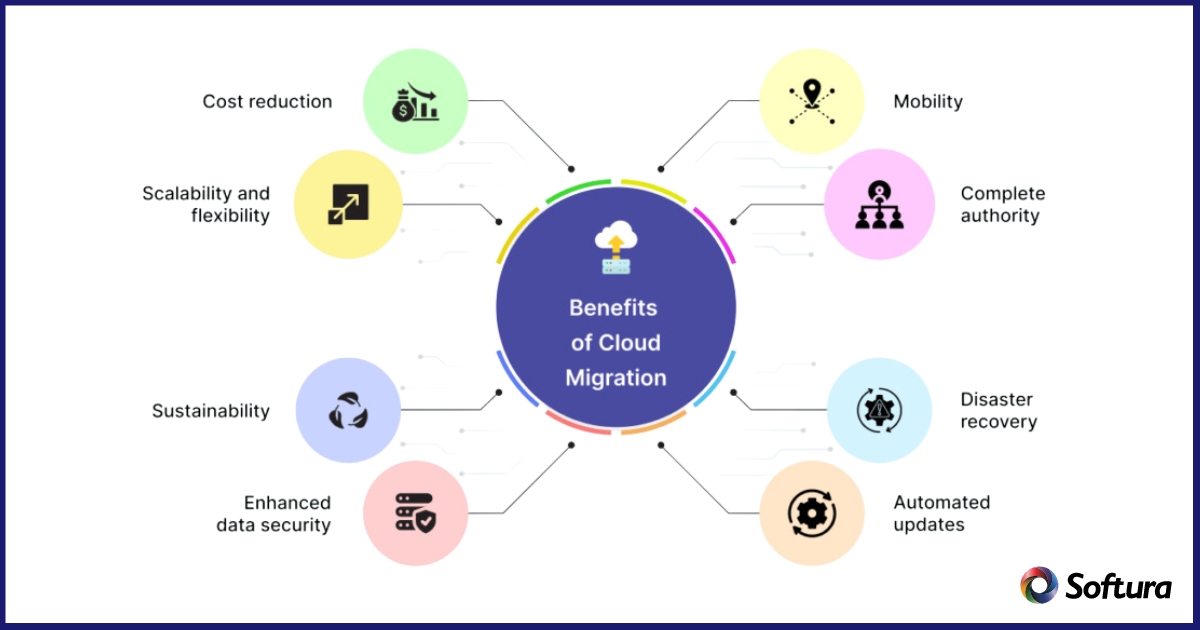"Our integration with the Google Nest smart thermostats through Aidoo Pro represents an unprecedented leap forward for our industry."
- Antonio Mediato, founder and CEO of Airzone.
Imagine a hot air balloon that is attached to the ground, aching to go up through its ropes and wanting to fly. That's your on-premises firm, constrained by rigid infrastructure and physical hardware. Cloud migration is the ambitious choice to jump through the hoops, explore the endless potential of the cloud, and discover game-changing advantages.
The Stats Don't Lie:
Netflix: The company's growth from a specialized DVD rental business to a major worldwide streaming player is evidence of the effectiveness of cloud migration. Due to the shortcomings of its on-premises infrastructure, Netflix started a multi-year cloud migration journey in 2008. This decision was made to achieve the scale and agility required to provide continuous streaming to millions of people worldwide at the same time, not only to save money.
The Impact:
Airbnb: Airbnb's platform redefines hospitality by connecting guests with distinctive lodging options throughout the globe. However, it may be a headache to control varying demand during the busiest travel seasons. Scaling up on-premises infrastructure to handle surges may be costly and time-consuming. But the ultimate solution was found in the cloud.
The Impact:
"Our integration with the Google Nest smart thermostats through Aidoo Pro represents an unprecedented leap forward for our industry."
- Antonio Mediato, founder and CEO of Airzone.
Cost Optimization: Picture yourself getting rid of those pricey, unused servers that are collecting dust in your basement. By migrating to the cloud, you only pay for the resources you really use—for example, energy for a single lightbulb as opposed to a whole power plant. This avoids recurring maintenance payments and reduces the cost of hardware up front. Imagine it as a handy car-sharing service instead of owning a fleet of vehicles; you may use it whenever you need it and you won't have to worry about ownership.
Scalability on Demand: Think about your online business during a busy season. The strain on the on-premises infrastructure might cause it to fail, leading to inconvenient downtime. However, using the cloud is like having a group of IT specialists at your disposal. To accommodate the spike, you may quickly spin up more servers, storage, and processing power. When things settle down, you can then scale back down. No more rushing to replace hardware or dealing with unhappy customers because websites don't work properly.
Enhanced Security: Safeguarding your on-site data center might make you feel as if you're defending Fort Knox. On the other hand, cloud providers make significant investments in cutting edge security technologies including intrusion detection, encryption, and firewalls. They provide a degree of protection that most organizations can't match on their own since they have devoted teams of security professionals who are always upgrading and monitoring their defenses. You can get easy knowing that your data is secure in the virtual vault of the cloud.
Improved Agility: With on-premises systems, introducing new features or apps used to be a laborious, sluggish process. Cloud migration modifies the rules. Updates and apps may be released more quickly, and you can iterate and improve in real time depending on user input. Because of your agility, you can react swiftly to shifting market needs and maintain an advantage over the competition. Imagine yourself getting where you're going considerably faster, like to driving a racing car rather than a cumbersome old truck.

Global Reach: Consider providing global client service without having to oversee servers in every location. It's made feasible via the cloud! Global users may be guaranteed rapid access and minimal latency with geographically dispersed data centers. By doing this, you may expand your company globally and get access to new markets without having to deal with the logistical challenges of maintaining physical facilities. Think of it like having branches all over the globe without having to pay for real estate.
Disaster Recovery: Imagine a natural catastrophe that strikes your data center. This is disaster recovery. On-site, recovery could be difficult to execute. But failover and automated backups are provided via the cloud. Your systems may quickly move to a different data center in the event of an issue, guaranteeing minimum downtime and business continuity. It functions similarly to an automated backup generator for your whole IT system, ready to go whenever necessary.
Innovation Acceleration: Just picture having low-cost access to the newest machine learning and artificial intelligence capabilities. It's made feasible via the cloud! Modern technologies are widely accessible, allowing you to experiment, think creatively, and create new solutions more quickly than before. It's similar to having a toolbox full with the newest technology, enabling you to construct incredible things.
Bonus Cloud Migration Tips:
"By analyzing the data from our connected lights, devices and systems, our goal is to create additional value for our customers through data-enabled services that unlock new capabilities and experiences."
- Harsh Chitale, leader of Philips Lighting’s Professional Business.
The use cases discussed above are just a few examples of how Artificial Intelligence (AI) can positively impact the manufacturing industry.
To get the most out of AI in manufacturing, businesses need expert advice and custom solutions. Softura is at the front of this AI revolution. We offer customized AI development services and support to meet the specific needs of manufacturing companies that want to use AI technologies.
To learn more about any of these AI uses or think about implementing similar AI-based solutions in their own operations, get in touch with Softura right away.
"Our integration with the Google Nest smart thermostats through Aidoo Pro represents an unprecedented leap forward for our industry."
- Antonio Mediato, founder and CEO of Airzone.
Onboard Offshore Mobile App Developers
Develop Mobile application and integrate it into your business processes with Softura's dedicated offshore mobile app developers!